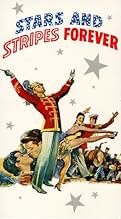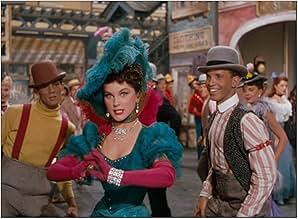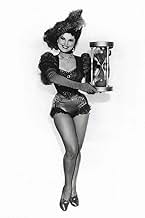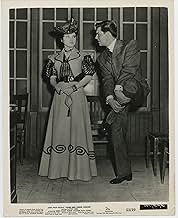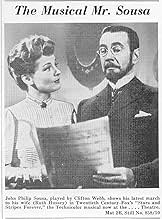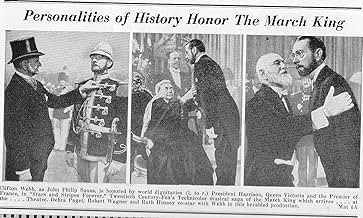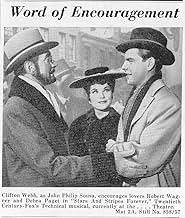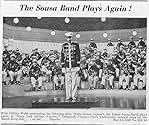IMDb RATING
7.1/10
1K
YOUR RATING
A film biography of the composer John Philip Sousa, from his early days in the Marine Corps Band through the Spanish-American War in 1898.A film biography of the composer John Philip Sousa, from his early days in the Marine Corps Band through the Spanish-American War in 1898.A film biography of the composer John Philip Sousa, from his early days in the Marine Corps Band through the Spanish-American War in 1898.
- Director
- Writers
- Stars
- Awards
- 3 nominations total
Thomas Browne Henry
- David Blakely
- (as Tom Browne Henry)
Frank Ferguson
- Mr. Wells
- (scenes deleted)
Aladdin
- Orchestra Conductor
- (uncredited)
- …
Bill Alcorn
- Specialty Dancer
- (uncredited)
Sharon Jan Altman
- Helen Sousa
- (uncredited)
Jon Andrews
- Minor Role
- (uncredited)
John Baer
- Chorus Boy at 'El Capitan' Rehearsal
- (uncredited)
Barbara Bailey
- Dancer
- (uncredited)
Patricia Barker
- Minor Role
- (uncredited)
Alvin Beam
- Minor Role
- (uncredited)
Bobker Ben Ali
- Reporter
- (uncredited)
- Director
- Writers
- All cast & crew
- Production, box office & more at IMDbPro
Featured reviews
10lawprof
John Philip Sousa was not only America's "March King," he was a skilled organizer and entertainer who also composed much music now thoroughly unknown to most Americans (and fans elsewhere). His life spanned the era of an optimistic, brash America where live music was the only music to the burgeoning and eventually triumphant victory of an insatiable technology that even in Sousa's lifetime was employed to record almost everything. Sousa benefited from the new world of recording and he can be heard on compact disc in his later years conducting his famed quasi-military band.
20th Century Fox enlisted a cadre of fine performers for a seamlessly entertaining biopic of John Philip Sousa with a nice, anachronistically innocent, fictional romance interwoven with the band leader/composer's story.
As Sousa Clifton Webb brings to life a character who was, as in reality, ambitious and driven to succeed. Sousa left the Marine Corps, where he led The President's Own, to start his hand-picked band. In uniforms which the leader designed, the outfit mirrored great military bands (of which the U.S., as opposed to England, had a clear shortage during Sousa's life). Sousa understood the importance of touring and he was light years ahead of the twentieth century's pops ensembles in making his musicians - and his music - as ubiquitous as travel of his day allowed.
Sousa's patient and adoring wife, Jennie, is well played by Ruth Hussey.
A nice romantic plot is the courtship of aspiring singer Lily Becker and the alleged inventor of the sousaphone, Willie Little. Lily is the gorgeous Debra Paget and Willie the young and upcoming Robert Wagner. Neither character existed in real life but their romance is well threaded into Sousa's story and is coyly affecting.
1952 was a hard year for many Americans. A self-designated lame duck president presided over an unpopular war, the first in our history in which victory in the traditional military sense wasn't a strategic or political objective. "The Stars and Stripes Forever" was a refreshing patriotic film that didn't require thinking about the realities of the day. I remember seeing it as a kid and loving every minute. I still watch it occasionally.
Credit also goes to the producer and to director Henry Koster for including a scene at an Atlanta festival where a black chorus sings The Battle Hymn of the Republic under Sousa's baton right after a rousing version of Dixie was performed. This was two years before Brown v. Board of Education, the Supreme Court's belated start of the final assault on the obscenity of legalized racial discrimination. I doubt everyone in the South felt good about that scene.
Musical pieces are well interwoven with the story and the final minutes have Sousa's most famous march, also the movie's title, played with a segue from his band to contemporary marching marines and soldiers. His superimposed spectral leading is a fine reminder of his role. A very nice touch.
Folks who only know Sousa from a relative handful of oft-performed and wonderful marches should check out his less well-known music. NAXOS is currently releasing a series of CDs of works that reflect Sousa's extraordinary creativity. But above all, Americans owe him an everlasting debt for composing stirring music that still animates listeners as it did when first performed under his baton.
10/10
20th Century Fox enlisted a cadre of fine performers for a seamlessly entertaining biopic of John Philip Sousa with a nice, anachronistically innocent, fictional romance interwoven with the band leader/composer's story.
As Sousa Clifton Webb brings to life a character who was, as in reality, ambitious and driven to succeed. Sousa left the Marine Corps, where he led The President's Own, to start his hand-picked band. In uniforms which the leader designed, the outfit mirrored great military bands (of which the U.S., as opposed to England, had a clear shortage during Sousa's life). Sousa understood the importance of touring and he was light years ahead of the twentieth century's pops ensembles in making his musicians - and his music - as ubiquitous as travel of his day allowed.
Sousa's patient and adoring wife, Jennie, is well played by Ruth Hussey.
A nice romantic plot is the courtship of aspiring singer Lily Becker and the alleged inventor of the sousaphone, Willie Little. Lily is the gorgeous Debra Paget and Willie the young and upcoming Robert Wagner. Neither character existed in real life but their romance is well threaded into Sousa's story and is coyly affecting.
1952 was a hard year for many Americans. A self-designated lame duck president presided over an unpopular war, the first in our history in which victory in the traditional military sense wasn't a strategic or political objective. "The Stars and Stripes Forever" was a refreshing patriotic film that didn't require thinking about the realities of the day. I remember seeing it as a kid and loving every minute. I still watch it occasionally.
Credit also goes to the producer and to director Henry Koster for including a scene at an Atlanta festival where a black chorus sings The Battle Hymn of the Republic under Sousa's baton right after a rousing version of Dixie was performed. This was two years before Brown v. Board of Education, the Supreme Court's belated start of the final assault on the obscenity of legalized racial discrimination. I doubt everyone in the South felt good about that scene.
Musical pieces are well interwoven with the story and the final minutes have Sousa's most famous march, also the movie's title, played with a segue from his band to contemporary marching marines and soldiers. His superimposed spectral leading is a fine reminder of his role. A very nice touch.
Folks who only know Sousa from a relative handful of oft-performed and wonderful marches should check out his less well-known music. NAXOS is currently releasing a series of CDs of works that reflect Sousa's extraordinary creativity. But above all, Americans owe him an everlasting debt for composing stirring music that still animates listeners as it did when first performed under his baton.
10/10
Watch this movie to get a historical perspective on some of America's and the World's Best Marching Band Music by John Philip Sousa!
The film is a chronology of snippets about the life of John Philip Sousa, his wife, and two apparently fictional friends written into the movie to have a young romantic sub-plot. All other performers in this film are not interesting enough in character to comment upon. Most of the actors were not even credited in the films running credits.
Clifton Webb (real name: Webb Parmalee Hollenbeck) was 63 years old when this movie was released in 1952. While his written dialog is not all that dramatic, Mr. Webb was a long time actor, singer, dancer, silent screen performer and theater performer before making this picture. Clifton Webb doesn't really have to act in this film. He carries the part of John Philip Sousa by standing straight with a stiff back, wearing many colorful marching band uniforms, looking very snobbishly "British" with a stiff demeanor while putting on the airs of a musical task-master demanding perfection, yet with a silent softness in his heart for the two younger performers, a 22 year old Robert (John) Wagner and the vivacious, effervescent, and energetic 18 year old Debra Paget (real name: Debralee Griffin). Mr. Webb died in 1966 at the age of 77 years old.
Ruth (Carol) Hussy at age 38 years plays Sousa's wife "Jennie" Sousa. Research reveals that Sousa's wife's name was Jane van Middlesworth Bellis whom Sousa met during rehearsals for a stage play she was performing in. They married when he was 25 years old. Ms. Hussy portrays the role of a wife and homemaker who runs the Sousa household and cajoles her husband to be sympathetic to the secret romance of Willie Little and Lily Becker. She is the `binder' of the Sousa household and the `understanding' wife behind the scenes.
Internet research reveals no existence of the two characters, Little and Becker, in real life. A web site of the Dallas Wind Symphony has a listing of every band member who performed in Sousa's Band. The name of Willie Little is not listed among them. The movie explains that Willie Little is a Marine Private who joins the Corps with the desire to perform in Sousa's Band. The Little character comes to Sousa's home, unannounced, with a Sousaphone Little claims to have "invented" and had built for Sousa's march music to make the sound better than a standard tuba which is too brash a sound for a concert hall. Sousa takes a liking to Private Little and takes him into his band. However, Sousa himself gave a personal interview to the Christian Science Monitor on May 30, 1922 and claims that he, Sousa, approached the J.W. Pepper Company in Philadelphia and commissioned the Sousaphone to be made in 1893, one year after Sousa gives up his directorship of the Marine Band.
Debra Paget, best known for her part four years later as the beautiful `Lilia the Water Girl' in the epic The Ten Commandments, gives this film all the levity of young romance and a love tension which the mature Webb-Hussy parts can not produce. It is a pleasure to watch her dance and sing numbers as well as the way she gives Robert Wagner "love kicks" in the shins. At the age of 28 years Ms. Paget married for the third time and quit the motion picture business. A loss to all whom appreciates a beautiful woman!
When the battleship USS Maine is blown up in Havana Harbor on February 15, 1898 Willie Little re-enlists in the Marines and goes off to Cuba to fight in the four month Spanish-American War of 1898. He loses a leg and returns home to his "secret wife" Lily and a seat at a Sousa concert to entertain the hospital patients in Washington, D.C.
Historical data from various web sites highlight that John Philip Sousa was placed into the Marine Corps in 1867 at the age 13 years as an apprentice musician, by his father, John Antonio Sousa, who was a trombonist in the Marine Corps band, because young Sousa wanted to run away to join the circus. Eight years later, Sousa was discharged from the Marines (1875) at the age of 21 years. In the next five years Sousa builds a reputation good enough for the Marines to contact him and offer him the Directorship of the Marine Band. Sousa returns to the Corps and accepts the Directorship in 1880. Sousa is 26 years old and is now being referred to as a Sergeant Major (however his uniforms display no marine enlisted rank) until he departs the Marines at age 38 years (1892) to form his own civilian marching band because he cannot afford to support his family of wife and four children on Marine pay. Real photos of Sousa show him with a thick dark beard, which makes it believable, that the 63-year-old Webb can play the 38-year-old Sousa during the Marine years.
Watch this movie to get a good dose of the famous Sousa marches, Semper Fidelis (1888) the Official Marine Corps Hymn, Washington Post March (1889), and the Stars and Stripes Forever (1896) the Official March of the United States. You will even enjoy the band's playing of the song, Dixie as well as the inspiring gospel choir performing the Battle Hymn of the Republic when Sousa's Band marches into Atlanta after their commission to perform at a convention was canceled. If you like pretty, late-19th Century, dresses and snappy military band uniforms this is a movie to see. No one else could play John Philip Sousa but Clifton Webb. And, next Fourth of July when you see the Boston Pops Playing The Stars and Stripes Forever you will have some historical background into the world of the man who composed this enduring Spirit of America.
The film is a chronology of snippets about the life of John Philip Sousa, his wife, and two apparently fictional friends written into the movie to have a young romantic sub-plot. All other performers in this film are not interesting enough in character to comment upon. Most of the actors were not even credited in the films running credits.
Clifton Webb (real name: Webb Parmalee Hollenbeck) was 63 years old when this movie was released in 1952. While his written dialog is not all that dramatic, Mr. Webb was a long time actor, singer, dancer, silent screen performer and theater performer before making this picture. Clifton Webb doesn't really have to act in this film. He carries the part of John Philip Sousa by standing straight with a stiff back, wearing many colorful marching band uniforms, looking very snobbishly "British" with a stiff demeanor while putting on the airs of a musical task-master demanding perfection, yet with a silent softness in his heart for the two younger performers, a 22 year old Robert (John) Wagner and the vivacious, effervescent, and energetic 18 year old Debra Paget (real name: Debralee Griffin). Mr. Webb died in 1966 at the age of 77 years old.
Ruth (Carol) Hussy at age 38 years plays Sousa's wife "Jennie" Sousa. Research reveals that Sousa's wife's name was Jane van Middlesworth Bellis whom Sousa met during rehearsals for a stage play she was performing in. They married when he was 25 years old. Ms. Hussy portrays the role of a wife and homemaker who runs the Sousa household and cajoles her husband to be sympathetic to the secret romance of Willie Little and Lily Becker. She is the `binder' of the Sousa household and the `understanding' wife behind the scenes.
Internet research reveals no existence of the two characters, Little and Becker, in real life. A web site of the Dallas Wind Symphony has a listing of every band member who performed in Sousa's Band. The name of Willie Little is not listed among them. The movie explains that Willie Little is a Marine Private who joins the Corps with the desire to perform in Sousa's Band. The Little character comes to Sousa's home, unannounced, with a Sousaphone Little claims to have "invented" and had built for Sousa's march music to make the sound better than a standard tuba which is too brash a sound for a concert hall. Sousa takes a liking to Private Little and takes him into his band. However, Sousa himself gave a personal interview to the Christian Science Monitor on May 30, 1922 and claims that he, Sousa, approached the J.W. Pepper Company in Philadelphia and commissioned the Sousaphone to be made in 1893, one year after Sousa gives up his directorship of the Marine Band.
Debra Paget, best known for her part four years later as the beautiful `Lilia the Water Girl' in the epic The Ten Commandments, gives this film all the levity of young romance and a love tension which the mature Webb-Hussy parts can not produce. It is a pleasure to watch her dance and sing numbers as well as the way she gives Robert Wagner "love kicks" in the shins. At the age of 28 years Ms. Paget married for the third time and quit the motion picture business. A loss to all whom appreciates a beautiful woman!
When the battleship USS Maine is blown up in Havana Harbor on February 15, 1898 Willie Little re-enlists in the Marines and goes off to Cuba to fight in the four month Spanish-American War of 1898. He loses a leg and returns home to his "secret wife" Lily and a seat at a Sousa concert to entertain the hospital patients in Washington, D.C.
Historical data from various web sites highlight that John Philip Sousa was placed into the Marine Corps in 1867 at the age 13 years as an apprentice musician, by his father, John Antonio Sousa, who was a trombonist in the Marine Corps band, because young Sousa wanted to run away to join the circus. Eight years later, Sousa was discharged from the Marines (1875) at the age of 21 years. In the next five years Sousa builds a reputation good enough for the Marines to contact him and offer him the Directorship of the Marine Band. Sousa returns to the Corps and accepts the Directorship in 1880. Sousa is 26 years old and is now being referred to as a Sergeant Major (however his uniforms display no marine enlisted rank) until he departs the Marines at age 38 years (1892) to form his own civilian marching band because he cannot afford to support his family of wife and four children on Marine pay. Real photos of Sousa show him with a thick dark beard, which makes it believable, that the 63-year-old Webb can play the 38-year-old Sousa during the Marine years.
Watch this movie to get a good dose of the famous Sousa marches, Semper Fidelis (1888) the Official Marine Corps Hymn, Washington Post March (1889), and the Stars and Stripes Forever (1896) the Official March of the United States. You will even enjoy the band's playing of the song, Dixie as well as the inspiring gospel choir performing the Battle Hymn of the Republic when Sousa's Band marches into Atlanta after their commission to perform at a convention was canceled. If you like pretty, late-19th Century, dresses and snappy military band uniforms this is a movie to see. No one else could play John Philip Sousa but Clifton Webb. And, next Fourth of July when you see the Boston Pops Playing The Stars and Stripes Forever you will have some historical background into the world of the man who composed this enduring Spirit of America.
This picture is always a sempar fidelis-It's always faithful when viewing. It is certainly a rousing tribute to the march king-John Philip Sousa.
The film takes us from the career of Sousa is the Marine Marching band to life afterward. Interesting that he served 5 presidents during his tenure with the marines.
Robert Wagner and Debra Paget play the couple who worked with Sousa in his band and married. The film briefly relates how they thought they'd keep their marriage a secret from Sousa. Wagner made his film debut the same year as this film in the other rousing "With A Song in My Heart." He certainly got experience with crutches in both films. Paget, will forever be remembered as Lilia, the water-girl in the epic "The 10 Commandments." Ironically, her name in this film was Lily as well.
The music was excellently staged and Clifton Webb was in fine form as Sousa. Why? It always seemed that Webb, a fine actor, was always a perfectionist in his films. This film was certainly no exception.
Again, a definitely rousing tribute to a great American. Ruth Hussey, who played Webb's wife in the film, was totally subordinate here. That's how the lifestyle was in the 1890s.
The film takes us from the career of Sousa is the Marine Marching band to life afterward. Interesting that he served 5 presidents during his tenure with the marines.
Robert Wagner and Debra Paget play the couple who worked with Sousa in his band and married. The film briefly relates how they thought they'd keep their marriage a secret from Sousa. Wagner made his film debut the same year as this film in the other rousing "With A Song in My Heart." He certainly got experience with crutches in both films. Paget, will forever be remembered as Lilia, the water-girl in the epic "The 10 Commandments." Ironically, her name in this film was Lily as well.
The music was excellently staged and Clifton Webb was in fine form as Sousa. Why? It always seemed that Webb, a fine actor, was always a perfectionist in his films. This film was certainly no exception.
Again, a definitely rousing tribute to a great American. Ruth Hussey, who played Webb's wife in the film, was totally subordinate here. That's how the lifestyle was in the 1890s.
When this movie was released it was the climax of one of those dreaded days when I had to accompany my mother on a downtown Boston, Massachusetts, shopping trip. I was never aware if my having to tag along was because she couldn't find a babysitter or because she wanted a little companionship, however young and immature, as she searched for a few things to update the family's wardrobe. By the time our trek through several department stores had bored me almost to the point of rebellion, we found ourselves entering the Mayflower Theater and I soon sat fascinated as this Technicolor treat unspooled before my amazed eyes. Even then I knew I wasn't seeing an historically accurate recreation of the life and times of the famous Mr. Sousa, whose music was familiar to me because of my father's enthusiasm for it. (He had played trumpet in his high school band.) But I knew I was seeing a glowingly colorful example of what Hollywood could do to entertain an audience in the mood for some patriotism, however jingoistic, with a touch of romantic flim-flam thrown in.
20th-Century Fox trowelled on the Technicolor; cast Ruth Hussey and Clifton Webb as about the most compatible-seeming mature couple one could imagine; assigned the ever-reliable Alfred Newman to supervise the music, which he did magnificently; and allowed two of its young up-and-comers, Robert Wagner and Debra Paget, to supply a little frosting on the cake. The end result thoroughly charmed that weary pre-teenager in 1953 and did, again, when I saw it on a TV broadcast many years later.
I have to confess that I watched it again to catch that absolutely amazing number, "Father's Got 'Em!", performed with energy to burn by the gorgeous Miss Paget in some of the tightest white tights I'd ever seen before or since. It's hilarious and a heck of a lot sexier than the struttings of most of today's so-called "divas."
Since this was a pre-CinemaScope Twentieth product, possibly produced while the three-strip Technicolor process was still in use, the VHS tape transfer may very well look as vividly rich as it did on that big screen so many years ago in Boston.
20th-Century Fox trowelled on the Technicolor; cast Ruth Hussey and Clifton Webb as about the most compatible-seeming mature couple one could imagine; assigned the ever-reliable Alfred Newman to supervise the music, which he did magnificently; and allowed two of its young up-and-comers, Robert Wagner and Debra Paget, to supply a little frosting on the cake. The end result thoroughly charmed that weary pre-teenager in 1953 and did, again, when I saw it on a TV broadcast many years later.
I have to confess that I watched it again to catch that absolutely amazing number, "Father's Got 'Em!", performed with energy to burn by the gorgeous Miss Paget in some of the tightest white tights I'd ever seen before or since. It's hilarious and a heck of a lot sexier than the struttings of most of today's so-called "divas."
Since this was a pre-CinemaScope Twentieth product, possibly produced while the three-strip Technicolor process was still in use, the VHS tape transfer may very well look as vividly rich as it did on that big screen so many years ago in Boston.
John Philip Sousa's position in American (and World) music is set in stone by now. Others have composed great marches (the English composer Edward Elgar with his four "Pomp and Circumstance Marches" for instance, two of which are memorable), and such major composers like Wagner and Mendelsohn. But Sousa remains the "March King". Like Johann Strauss the Younger, Alexander Scarlatti, and Scott Joplin, he is recalled for his domination of a single area of music: marches in this case, rather than waltzes, sonatas, or "rags". But this really does not explain why he remains the "March King". There is a sense of fun and spirit in Sousa's marches that transcend what a march is usually supposed to do.
Marches were originally meant for troops to walk in step either on a training field or on the battlefield (music was used until the end of the 19th Century to keep up the spirits of the soldiers, and even to help orchestrate the speed they were to fight at when running across the battlefield). Sousa came from a musical family (his father was a musician in the Marine Corps band). Sousa followed in his father's footsteps, but played several instruments and rose to be the bandmaster. He began composing pieces for the Marine Corps Band, such as "Semper Fidelis", "The Washington Post March", "Manhattan Beach", and he tried to expand his abilities into other fields. When he left the Marine Corps, he formed his own band, which he developed with a perfect balance of brass, stings, percussion, and woodwinds. His band would go around the world performing, not only his own pieces, but also other composers as well.
The movie does touch, once or twice, on Sousa's attempts to broaden his musical ability by doing Broadway shows (operettas). At the start Clifton Webb, as Sousa, does play the melody of "Semper Fidelis" for his wife Jenny (Ruth Hussey) as a tune to be sung. It doesn't quite work. He would do a successful operetta (which is still revived) called EL CAPITAN, which starred DeWolf Hopper (we hear an actor as Hopper singing a tune at a rehearsal during the movie). However, EL CAPITAN had a book by Charles Klein, a major dramatist of the 1890s - 1915 (he drowned in the Lusitania disaster). Klein was not a W. S. Gilbert, but his libretto was serviceable. Unfortunately Sousa never had another librettist/lyricist like Klein, and spent the rest of his career seeking his "Gilbert". As a result the leading operetta composer from the U.S. in Sousa's lifetime (and since) was Victor Herbert.
Sousa was talented in other ways too. He sometimes wrote clever lyrics to comic songs, such as "A Typical Song of Zanzibar". He wrote about five comic novels too. He designed the special marching tuba, the "Sousaphone" (which is shown in the film being designed by Webb and Robert Wagner). But it is the string of great marches that he left which are his great donation to our culture. The reason is more than just his gift for melodious music. He was a genius at composition and orchestration - probably the best orchestrator among the major American composers.
His best remembered march is the title march for this film: THE STARS AND STRIPES FOREVER. The film mentions how Sousa, on a trip for his health, was walking the deck of the liner at night and thought of the beat of the music. We hear Webb describing the moment (quoting a passage from Sousa's memoirs, MARCHING ALONG), and the film ends with the playing of the great march. The film does not mention that that Sousa also composed words to be sung to it (which occasionally still are sung). A few years ago, the U.S. Congress formally adopted THE STARS AND STRIPES FOREVER as the national march.
I have gone into a great deal of detail regarding Sousa and his career, for the movie (for a biography) skims a lot. His literary efforts are not dealt with, and the film ends (really) with the playing of THE STARS AND STRIPE FOREVER. That was in 1899. Sousa would live until 1932, and would be a public figure until then. He was still composing until the 1920s.
Webb had an extensive musical comedy career in the 1920s and 1930s (he was one of the stars in Irving Berlin's AS THOUSANDS CHEER, for example). But aside from an occasional tune he sings like "When I wore a Tulip" or a dance he does with Jeanne Craig in CHEAPER BY THE DOZEN, he never did a musical. STARS AND STRIPES FOREVER is his one "musical film". He is credible as Sousa, but the film never really goes deeply into the great man. The dramatic portions are handled by Robert Wagner and Deborah Paget as friends and lovers, whose love affair is twisted for awhile by the Spanish American War. The film is certainly watchable (the cast is game, and the music is first rate) but it is not a showcase for Webb's talents in musicals. Ironically he could have been in Vincent Minelli's THE BANDWAGON with Fred Astaire and Cyd Charisse, but opted for the lead as Sousa. Probably a bad decision - but it is hard to say. Every July 4th STARS AND STRIPES FOREVER is shown for it's great holiday music. What we lost in not seeing Webb opposite Astaire is not enough to prevent our still seeing Webb as the great maestro composer.
Marches were originally meant for troops to walk in step either on a training field or on the battlefield (music was used until the end of the 19th Century to keep up the spirits of the soldiers, and even to help orchestrate the speed they were to fight at when running across the battlefield). Sousa came from a musical family (his father was a musician in the Marine Corps band). Sousa followed in his father's footsteps, but played several instruments and rose to be the bandmaster. He began composing pieces for the Marine Corps Band, such as "Semper Fidelis", "The Washington Post March", "Manhattan Beach", and he tried to expand his abilities into other fields. When he left the Marine Corps, he formed his own band, which he developed with a perfect balance of brass, stings, percussion, and woodwinds. His band would go around the world performing, not only his own pieces, but also other composers as well.
The movie does touch, once or twice, on Sousa's attempts to broaden his musical ability by doing Broadway shows (operettas). At the start Clifton Webb, as Sousa, does play the melody of "Semper Fidelis" for his wife Jenny (Ruth Hussey) as a tune to be sung. It doesn't quite work. He would do a successful operetta (which is still revived) called EL CAPITAN, which starred DeWolf Hopper (we hear an actor as Hopper singing a tune at a rehearsal during the movie). However, EL CAPITAN had a book by Charles Klein, a major dramatist of the 1890s - 1915 (he drowned in the Lusitania disaster). Klein was not a W. S. Gilbert, but his libretto was serviceable. Unfortunately Sousa never had another librettist/lyricist like Klein, and spent the rest of his career seeking his "Gilbert". As a result the leading operetta composer from the U.S. in Sousa's lifetime (and since) was Victor Herbert.
Sousa was talented in other ways too. He sometimes wrote clever lyrics to comic songs, such as "A Typical Song of Zanzibar". He wrote about five comic novels too. He designed the special marching tuba, the "Sousaphone" (which is shown in the film being designed by Webb and Robert Wagner). But it is the string of great marches that he left which are his great donation to our culture. The reason is more than just his gift for melodious music. He was a genius at composition and orchestration - probably the best orchestrator among the major American composers.
His best remembered march is the title march for this film: THE STARS AND STRIPES FOREVER. The film mentions how Sousa, on a trip for his health, was walking the deck of the liner at night and thought of the beat of the music. We hear Webb describing the moment (quoting a passage from Sousa's memoirs, MARCHING ALONG), and the film ends with the playing of the great march. The film does not mention that that Sousa also composed words to be sung to it (which occasionally still are sung). A few years ago, the U.S. Congress formally adopted THE STARS AND STRIPES FOREVER as the national march.
I have gone into a great deal of detail regarding Sousa and his career, for the movie (for a biography) skims a lot. His literary efforts are not dealt with, and the film ends (really) with the playing of THE STARS AND STRIPE FOREVER. That was in 1899. Sousa would live until 1932, and would be a public figure until then. He was still composing until the 1920s.
Webb had an extensive musical comedy career in the 1920s and 1930s (he was one of the stars in Irving Berlin's AS THOUSANDS CHEER, for example). But aside from an occasional tune he sings like "When I wore a Tulip" or a dance he does with Jeanne Craig in CHEAPER BY THE DOZEN, he never did a musical. STARS AND STRIPES FOREVER is his one "musical film". He is credible as Sousa, but the film never really goes deeply into the great man. The dramatic portions are handled by Robert Wagner and Deborah Paget as friends and lovers, whose love affair is twisted for awhile by the Spanish American War. The film is certainly watchable (the cast is game, and the music is first rate) but it is not a showcase for Webb's talents in musicals. Ironically he could have been in Vincent Minelli's THE BANDWAGON with Fred Astaire and Cyd Charisse, but opted for the lead as Sousa. Probably a bad decision - but it is hard to say. Every July 4th STARS AND STRIPES FOREVER is shown for it's great holiday music. What we lost in not seeing Webb opposite Astaire is not enough to prevent our still seeing Webb as the great maestro composer.
Did you know
- TriviaAccording to Paul Bierley's biography of John Philip Sousa, "John Philip Sousa, American Phenomenon", several musicians who had played under Sousa attended the world premiere of the film but walked out in disgust.
- GoofsIn the film the famous Sousaphone was invented by Willy Little. In actuality the first sousaphone was developed by James Welsh Pepper in 1893 at the request of John Philip Sousa.
- Quotes
John Philip Sousa: What in the name of all get out's been keeping you so long?
Jennie Sousa: I was hearing the children's prayers.
John Philip Sousa: Does that take all night?
Jennie Sousa: They were praying for you.
- Crazy creditsDuring the opening display of 20th Century Fox's logo, Sousa's "Semper Fidelis" was played instead of the usual 20th Century fanfare
- Alternate versionsSome releases include at the end a clip of the real John Philip Sousa leading the band in one of his famous marches.
- ConnectionsFeatured in Family Classics: Family Classics: Stars and Stripes Forever (1963)
- SoundtracksSemper Fidelis
(uncredited)
Music by John Philip Sousa (1888)
Played during the opening credits
Also played by the Marine band at the presidential reception
- How long is Stars and Stripes Forever?Powered by Alexa
Details
- Release date
- Country of origin
- Language
- Also known as
- Stars and Stripes Forever
- Filming locations
- Production company
- See more company credits at IMDbPro
- Runtime
- 1h 30m(90 min)
Contribute to this page
Suggest an edit or add missing content

